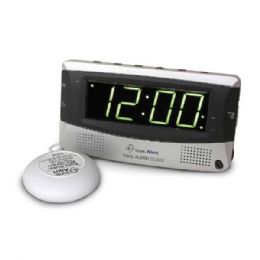
What are Hearing Impaired Clocks?
Hearing Impaired Clocks are clocks designed for people who need additional measures of timekeeping other than what the traditional alarm clock has to offer. Hearing impaired clocks are valuable instruments for keeping track of time, and to utilize as alarms for waking, reminders, and as alert devices for people who have hearing impairments.
Hearing Impaired Clocks are used as an essential resource for persons with hearing impairment to live a higher quality of independent living. Hearing impaired clock technology has improved since the beginning of the 20th century and continues to find innovative ways to help persons in need of an advanced alert environment. Hearing impairment comes from a variety of issues and can be genetic, brought on by trauma, or acquired with age.
How to Choose the Best Hearing Impaired Clocks
Choosing the best hearing impaired clock requires a choice that best meets your own unique requirements. People purchasing a hearing impaired clock commonly buy based on the light source, the display, the vibration mechanism, and the alarm abilities.
Traditional functions of hearing impaired clocks may include:
Some standard features to look for on hearing impaired clocks include:
Use the “5 'W' System” to help determine which hearing impaired clock is right for you:
Who - Consider who this clock will affect. Whether you live alone, or if you live with others. You may want a clock that can jolt you awake but leave your partner sound asleep, or if you live alone, you may want very loud alarms and flashing lights to ensure you can hear/see them.
What- Examine what functions and mechanisms that hearing impaired clocks have to offer. Determine what features you require for your own unique environment, security and independence. Evaluate the light source, vibration strength, alarm decibels and other functions you need, including whether you require wireless and/or portable systems.
When - When do you need your hearing impaired clock? Determining whether you will need to use your clock once or multiple times a day, as well as considering how many distinct alarm sounds you require throughout the day for medication reminders, cooking and other tasks and activities will help you make the right choice.
Where- Do you need to carry your alarm clock with you, or do you just need it for a jolt in the morning? Hearing impaired clocks come in different shapes and sizes, so you need to determine where you will be using your clock to figure out whether it should be portable or stationary.
Why- Consider your diagnosis and check with your doctor before purchasing a hearing impaired clock. Contrary to what the name suggests, these little gadgets provide more solutions for other applications than hearing impairment.
Hulet Smith, OTR/L
Rehabmart Co-Founder & CEO
jz